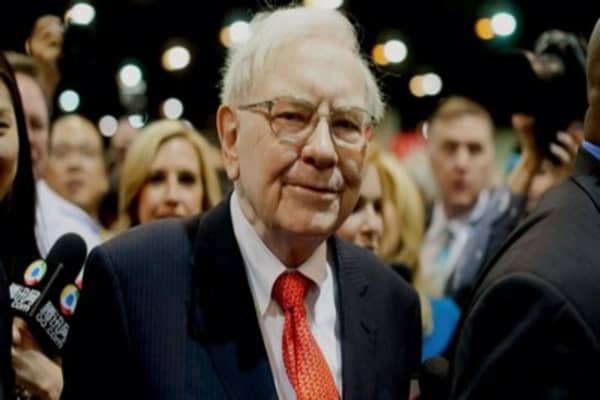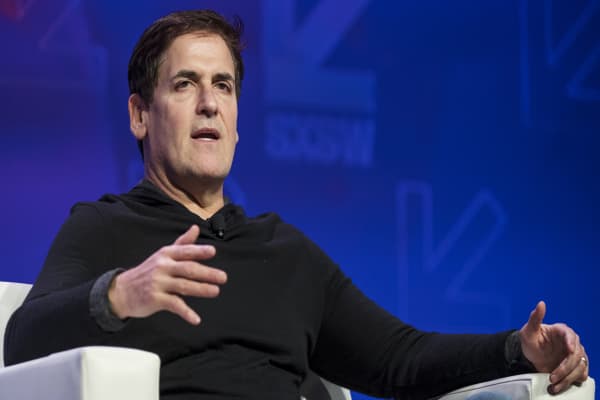 Warren Buffett says people like him are the problem with the U.S. economy.
Warren Buffett says people like him are the problem with the U.S. economy.
With a net worth of more than $75 billion, Buffett is currently the second richest man alive, according to Forbes. As the CEO of investing house Berkshire Hathaway, he is hallowed as the Oracle of Omaha. But for all his personal success, Buffett says the issue really is the 1 percent.
“The real problem, in my view, is — this has been — the prosperity has been unbelievable for the extremely rich people,” says Buffett on PBS Newshour.
“If you go to 1982, when Forbes put on their first 400 list, those people had [a total of] $93 billion. They now have $2.4 trillion, [a multiple of] 25 for one,” he says. “This has been a prosperity that’s been disproportionately rewarding to the people on top.”
“THE REAL PROBLEM, IN MY VIEW, IS … THE PROSPERITY HAS BEEN UNBELIEVABLE FOR THE EXTREMELY RICH PEOPLE.”
The stock market has been trending upwards since the crash in March 2009 and the U.S. economy is growing at roughly 2 percent, says Buffett on Newshour. That growth rate (while a third less than the 3 percent rate President Donald Trump has been touting) is a healthy number for the economy and will improve the quality of life of many Americans.
It will add “$19,000 of GDP per person, family of four, $76,000 in one generation,” says Buffett. “So, your children and your children’s children and all that, they will live far, far, far better than we live with 2 percent growth.”
And yet, many individuals are stuck. “The economy is doing well, but all Americans aren’t doing well,” says Buffett.
Part of the reason some are struggling, says the octogenarian investor, is that the automation and digitization of the U.S. labor force is happening faster than employees can be retrained.
“We always see shifts in employment. If you think about it, if you go back to 1800, it took 80 percent of the labor force to produce enough food for the country. Now it takes less than 3 percent. Well, the truth is that market systems move people around,” says Buffett.
“There’s always a mismatch. I mean, you know, as the economy evolves, it reallocates resources.”
As employees fall out of the labor force because their skills are no longer utilized, Buffett says it ought to be the responsibility of society to take care of them as they are retrained to re-enter the workforce.
“WHEN YOU HAVE SOMETHING THAT’S GOOD FOR SOCIETY, BUT TERRIBLY HARMFUL FOR GIVEN INDIVIDUALS, WE HAVE GOT TO MAKE SURE THOSE INDIVIDUALS ARE TAKEN CARE OF.”
The evolving economy “doesn’t benefit the steelworker maybe in Ohio,” says Buffett on Newshour. “And that’s the problem that has to be addressed, because when you have something that’s good for society, but terribly harmful for given individuals, we have got to make sure those individuals are taken care of.”
Buffett made his extreme wealth by investing in the stock market, an interest that took hold young. Buffett bought his first stock when he was 11 and has been in the market for 75 years. He recommends others do the same.
“They should just keep buying and buying and buying a little bit of America as they go along. And 30 or 40 years from now, they will have a lot of money,” he says.
In an effort to compensate for the wealth inequality that he himself has benefited from, Buffett and his billionaire buddy Microsoft co-founder Bill Gates co-founded the Giving Pledge, a voluntary commitment by the richest people in the world to give away at least half of their wealth. The goal of the Giving Pledge is not only to help those in need but to encourage others to do the same.
Like this story? Like CNBC Make It on Facebook.
See also:
These 14 billionaires just promised to give away more than half of their money like Bill Gates and Warren Buffett
This is the key lesson Warren Buffett learned from buying his first stock at age 11
Bill Gates, Warren Buffett and Richard Branson have the same unexpected definition of success






